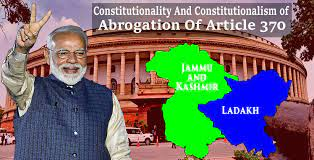Attorney General R Venkataramani said in Supreme Court during hearing on abrogation of Article 370 :
If you look at the constitutional integration process of the rest of the country and compare it to the constitutional integration process of J&K- the historical narration shows that there is no fundamental difference at all.
He also said, "Can a body like the Constituent Assembly of J&K have a final say on Art 370? It is not a constituent body of parliament of India. It doesn't have all attributes and powers".
He also said, "The political compulsions that happened in case of J&K made a very slight deviation...Article 370 is nothing but the outcome of the formalisation of the principles and the procedures for interpretation".
Venkataramani said, "We have to look at this from the text and context and the intent of Article 370".
"Article 370 conferring powers on the President is not in the nature of executive power of the president. The executive head is conferred a legislative power- a very extensive and vast power," he submitted.
The bench comprises Chief Justice of India DY Chandrachud, and Justices Sanjay Kishan Kaul, Sanjiv Khanna, BR Gavai, and Surya Kant.
Over 20 petitions are pending before the Supreme Court challenging the Central government's 2019 decision to abrogate Article 370 of the Constitution, which resulted in the revocation of Jammu and Kashmir's special status. The erstwhile State was subsequently bifurcated into two Union Territories.
When the matters were listed in March 2020, a five-judge Constitution Bench of the Supreme Court had decided not to refer the batch of petitions to a seven-judge Constitution Bench, despite some petitioners seeking such a reference.
On August 2, the top court began final hearings in the matter with a question to the petitioners about whether the Constitution makers and Article 370 itself envisaged the provision as a permanent or temporary one.
The Court sought to know whether the Article was envisaged as a permanent provision merely because the Constituent Assembly of Jammu and Kashmir (J&K), which was empowered to recommend the deletion of the provision, ceased to exist in 1957.
On August 4, the top court asked whether the Article would become part of the basic structure of the Constitution if it is accepted that Article 370 of the Constitution became permanent when the Constituent Assembly of Jammu and Kashmir was dissolved in 1957, says 'Bar and Bench'.
On August 9, the Court said that in a Constitutional democracy like India, the opinion of people on public issues is sought through established institutions and not referendums as in the case of Brexit in the United Kingdom.
The top court, on August 10, remarked that in no way was the integration of Jammu and Kashmir with India in 1948 conditional. The integration was absolute and complete in every which way, remarked CJI Chandrachud.
On August 24, the Central government began its arguments in Supreme Court defending its 2019 move to abrogate Article 370 of the Constitution.
Solicitor General (SG) Tushar Mehta, who represented the Central government, invoked Pandit Jawaharlal Nehru and stated that the first Prime Minister had said that India would not recognize rulers of princely States who joined India as having any 'divine' rights.
On Aug 28, the Court orally observed that Article 35A of the Constitution, which was repealed in 2019, effectively conferred special rights on the people of Jammu and Kashmir and, in the process, curtailed certain fundamental rights of persons domiciled in the rest of India.
CJI: Suppose there is a Constituent Assembly and it recommends to the President - do not abrogate 370, is it open to the president then to override the advice?
AG: That power of recommendation is not available to the assembly. It has to only recommend to render 370 inoperative.
CJI: Recommendation is not just an opinion. When the constitution uses the term "recommendation", it means a positive decision because Art 370 uses different phrases. It uses consultation, concurrence, decision, and recommendation.
AG: Recommendation is not binding on the president. Therefore, it is recommendation. It is not concurrence.
CJI Chandrachud: The hues of the word 'recommendation' is not by itself dispositive of the content of the expression as to whether it is merely and advice or condition precedent.
CJI: I'll give examples of 'recommendation' being used in Constitution- Art 109, 117. 109 deals with money bills. A money bill is not introduced in Rajya sabha, always introduced in lok sabha. After the bill is passed in Lok Sabha, it's sent to Rajya sabha for recommendation.
CJI: Those recommendations aren't binding on the lok sabha. It may either accept them or accept them in part, or reject them. That's what Art 109(2) it says recommendation of Rajya sabha doesn't bind lok sabha.
Now see Art 117. It says that a money bill cannot be introduced except on a recommendation of president.
He pointed out that in Art 117, the same word 'recommendation' is used but here recommendation is mandatory. You can't move the bill except on recommendation of president.
·
CJI: In 370, the recommendation is a condition precedent and condition in terms of time. The recommendation has to be before the abrogation by president. Thus, to say that this recommendation is just an opinion and not binding...








No comments:
Post a Comment